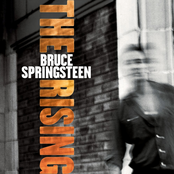The Rising

Biography
The Rising is the 12th studio album by Bruce Springsteen, released in 2002. In addition to being Springsteen's first studio album in seven years, it was also his first with the E Street Band in 18 years. It is centered around Springsteen's reflections on the September 11, 2001 attacks. Upon its release, The Rising was a critical and commercial success, and hailed as the triumphant return of "The Boss". It debuted at #1 on the Billboard 200 chart, with first-week sales of over 520,000 copies. Wi...
The Rising is the 12th studio album by Bruce Springsteen, released in 2002. In addition to being Springsteen's first studio album in seven years, it was also his first with the E Street Band in 18 years. It is centered around Springsteen's reflections on the September 11, 2001 attacks. Upon its release, The Rising was a critical and commercial success, and hailed as the triumphant return of "The Boss". It debuted at #1 on the Billboard 200 chart, with first-week sales of over 520,000 copies. With this, Springsteen became the oldest person to achieve a first-week sales of over a half of a million in the U.S. The album also garnered a Grammy Award for Best Rock Album in 2003; although nominated for, and widely favored to take, the Album of the Year award as well, it was bested by Norah Jones' debut album Come Away with Me. Title song "The Rising" was also a Grammy nominee and recipient. For the year 2002, The Rising was one of only two albums to receive Rolling Stone's highest rating—five stars—the other being Beck's Sea Change. While most of the songs were written after September 11, 2001, a few of them pre-date the attacks. "My City of Ruins" was originally performed in, and written about, Asbury Park, New Jersey. After its performance by Springsteen on the post-September 11 America: A Tribute to Heroes telethon, however, the song took on an expanded meaning. "Further On (Up the Road)" was performed live in Madison Square Garden during the summer of 2000 at the end of the Springsteen-E Street Reunion Tour, and was professionally recorded, although it was not included in the HBO, DVD, or CD versions of Bruce Springsteen & the E Street Band: Live in New York City. "Waitin' on a Sunny Day" was originally written in the early- or mid-1990s and played in at least one soundcheck during the Reunion Tour, and Springsteen has commented that "Nothing Man" was originally completed in 1994 but re-recorded for this album. Helped by a substantial marketing campaign — pre-release promotion was the biggest of Springsteen's career — and the concurrent Rising Tour, The Rising went on to become Springsteen's first #1 album on the U.S. pop albums chart since his 1995 Greatest Hits album and would go on to sell about 2,100,000 copies in the United States, making it Springsteen's best-selling album of new material since 1987's Tunnel of Love. Initial critical response to The Rising was very positive. At Metacritic, which assigns a normalized rating out of 100 to reviews from mainstream critics, the album has received an average score of 82, based on 21 reviews. Read more on Last.fm. User-contributed text is available under the Creative Commons By-SA License; additional terms may apply.
